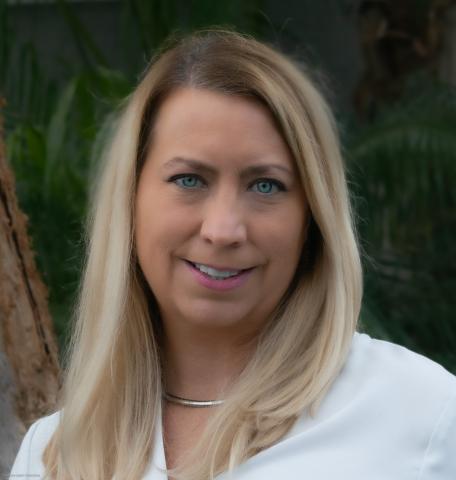
Alum Roxanne Upah-Crenshaw, PhD, Works to Make Profession More Diverse

Roxanne Upah-Crenshaw, PhD, graduated from the PhD in Clinical Psychology program. She is tackling the systemic biases and racism within the psychology profession, starting with the EPPP, which all licensed psychologists will be familiar with. She currently works for the Greater Los Angeles VA Healthcare System as a staff psychologist, which is where she heard her first call to action.
“After the murder of George Floyd, I experienced a type of racial awakening that left me feeling so very helpless but called to do something,” said Dr. Upah-Crenshaw. “An email from a VA geriatric mental health listserv requested volunteers for an informal workgroup focused on gero-diversity, and I thought it was an opportunity to do something to improve racial equality within VA healthcare. I, along with six others around the US, formed the Cultural Humility in Geriatric Mental Health Care workgroup, and we first focused on providing a safe virtual space for VA mental health providers to talk about their grief and process in the wake of George Floyd’s murder. Shortly afterward, additional murders of Black and brown people made national news and motivated VA leaders, program managers, and front-line staff to put Diversity, Equity, and Inclusion in the forefront of learning and education.”
Requests for materials and presentations started coming in from across the United States. Dr. Upah-Crenshaw started presenting with another psychologist from the workgroup, and they focused on addressing microaggressions in team-based healthcare. “I had a lot of learning to do myself,” she said. “I learned more about the systemic powers that keep racism in place. I learned that individuals can be very motivated to make positive changes; however, nothing will change if the system does not support those changes. This is where my passion was born for highlighting systemic issues in the field of clinical psychology that perpetuate racial inequality.”
At the American Psychological Association (APA) annual convention in August, Dr. Upah-Crenshaw, along with Tamara Rumburg, PsyD, and Katey Watry, PsyD, presented a session titled “EPPP: Protecting the American Public from Diversity, Equity, and Inclusion?” The presenters stated that “research shows racial bias in pass rates of the EPPP, yet it continues to be used by state licensing boards.”
The EPPP is the Examination for Professional Practice in Psychology. It is a requirement for licensure in all US states. They garnered interest from top executives of the Association of State and Provincial Psychology Boards (ASPPB), which produces the test.
In a 2023 Monitor article, the APA stated, “…concerns have been raised over whether the new test is a good measurement of clinical skills and whether it creates more barriers to entry for applicants, particularly those with marginalized identities.”
Research from Brian Sharpless, PhD, at Argosy University, shows “discrepancies in exam performance based on applicants’ ethnicity. A Freedom of Information Act request showed that of 4,892 individuals in New York who took the EPPP-1 for the first time, significantly more Black and Hispanic applicants failed compared to White applicants (Sharpless, B., The Journal of Psychology, Vol. 153, No. 2, 2019).”
“Representation matters, and it matters at all healthcare points of contact,” said. Dr. Upah-Crenshaw. “Especially in our field of psychology, there is a long history of mistrust within BIPOC communities from being harmed at the hands of psychologists. When these communities start seeing their own members practicing psychology, the implied message is one of safety. We need broader representation if we want to be seen as a safe option for care, and we want the public to trust our services.”
Dr. Upah-Crenshaw and colleagues have suggestions for how the EPPP process could be changed to support diversity, including:
- Redesign the EPPP by licensed psychologists to be more valid in the context of increasing diversity.
- Separate the exam for different subspecialties.
- Establish task forces of potential examinees and licensed psychologists providing financial compensation for feedback.
- Employ independent reviews.
- Remove EPPP as a gatekeeper by weighing the exam less in the licensing equation.
- Reduce cut scores to increase diversity in the field.
To go further, Dr. Upah-Crenshaw offered suggestions for assessing competence without the EPPP, including:
- Design essay/vignette-based exams, which allow for individual differences/approaches.
- Offer specialty area exams only (nothing for general practice).
- Administer an ethics/jurisprudence exam that is regulated by each state's Board of Psychology.
- Use multiple measures, such as transcripts, multiple practicum placements with repeated competency assessments, comprehensive exam completion, APA-accredited internship completion, minimum number of supervision hours, and supervised postdoctoral hours, granting licensure if all are satisfactory.
- Use an APA/CPA accredited program exemption because passing the EPPP is highly correlated with graduating from APA/CPA programs.”
“I’ve grown my understanding of what competence is over the years, and I no longer conceptualize competence as being able to repeat things you heard in didactic learning or read in a scholarly article,” Dr. Upah-Crenshaw said. “I now view cultural humility, or genuine curiosity about differences, as more important than competence. Humility is giving up the illusion of being an expert.”
Dr. Upah-Crenshaw and her colleagues say the responsibility is with state licensing bodies and the APA. “This is a problem I hope states and professional organizations will come to care about and find ways to change,” she said. “I am encouraged by seeing so many other health fields and mental health professions become interested in addressing DEI. At the individual clinician level, I’m also so encouraged by the support of my peers.”
